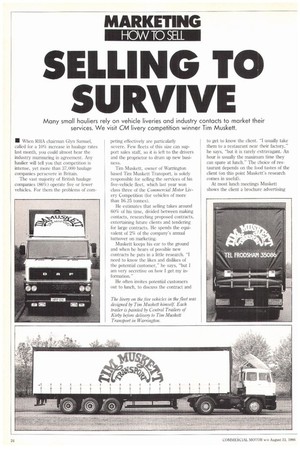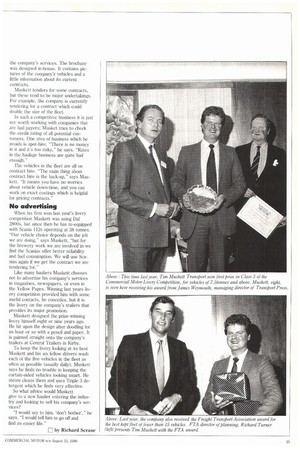SELLING TO SURVIVE
Page 26

Page 27

If you've noticed an error in this article please click here to report it so we can fix it.
Many small hauliers rely on vehicle liveries and industry contacts to market their services. We visit CM livery competition winner Tim Musket
• When RUA chairman Glyn Samuel, called for a 10% increase in haulage rates last month, you could almost hear the industry murmuring in agreement. Any haulier will tell you that competition is intense, yet more than 37,000 haulage companies persevere in Britain.
The vast majority of British haulage companies (86%) operate five or fewer vehicles. For them the problems of corn
peting effectively are particularly severe. Few fleets of this size can support sales staff, so it is left to the drivers and the proprietor to drum up new business.
Tim Muskett, owner of Warrington based Tim Muskett Transport, is solely responsible for selling the services of his five-vehicle fleet, which last year won class three of the Commercial Motor Livery Competition (for vehicles of more than 16.25 tonnes).
He estimates that selling takes around 60% of his time, divided between making contacts, researching proposed contracts, entertaining future clients and tendering for large contracts. He spends the equivalent of 2% of the company's annual turnover on marketing.
Muskett keeps his ear to the ground and when he hears of possible new contracts he puts in a little research. "I need to know the likes and dislikes of the potential customer," he says, "but I am very secretive on how I get my information."
He often invites potential customers out to lunch, to discuss the contract and to get to know the client. "I usually take them to a restaurant near their factory," he says, "but it is rarely extravagant. An hour is usually the rriaximum time they can spare at lunch." The choice of restaurant depends on the food tastes of the client (on this point Muskett's research comes in useful).
At most lunch meetings Muskett shows the client a brochure advertising the company's services. The brochure was designed in-house. It contains pictures of the company's vehicles and a little information about its current contracts.
Muskett tenders for some contracts, but these tend to be major undertakings. For example, the company is currently tendering for a contract which could double the size of the fleet.
In such a competitive business it is just not worth working with companies that are bad payers; Musket tries to check the credit rating of all potential customers. One area of business which he avoids is spot-hire. "There is no money in it and it's too risky," he says. "Rates in the haulage business are quite bad enough."
The vehicles in the fleet are all on contract hire. "The main thing about contract hire is the back-up," says Muskett. "It means you have no worries about vehicle down-time, and you can work on exact costings which is helpful for pricing contracts."
No advertising
When his twin won last year's livery competition Muskett was using Daf 2800s, but since then he has re-equipped with Scania 112s operating at 38 tonnes. "Our vehicle choice depends on the job we are doing," says Muskett, "but for the brewery work we are involved in we find the Scanias offer better reliability and fuel consumption. We will use Scanias again if we get the contract we are tendering for."
Like many hauliers Muskett chooses not to advertise his company's services in magazines, newspapers, or even in the Yellow Pages. Winning last years livery competition provided him with some useful contacts, he concedes, but it is the livery on the company's trailers that provides its major promotion.
Muskett designed the prize-winning livery himself eight or nine years ago. He hit upon the design after doodling for an hour or so with a pencil and paper. It is painted straight onto the company's trailers at Central Trailers in Kirby.
To keep the livery looking at its best Muskett and his six fellow drivers wash each of the five vehicles in the fleet as often as possible (usually daily). Muskett says he finds no trouble in keeping the curtain-sided vehicles looking smart. He steam cleans them and uses Triple 3 detergent which he finds very effective.
So what advice would Muskett give to a new haulier entering the industry and looking to sell his company's services?
"I would say to him, 'don't bother'," he says. "I would tell him to go off and find an easier life."
by Richard Scrase












































































